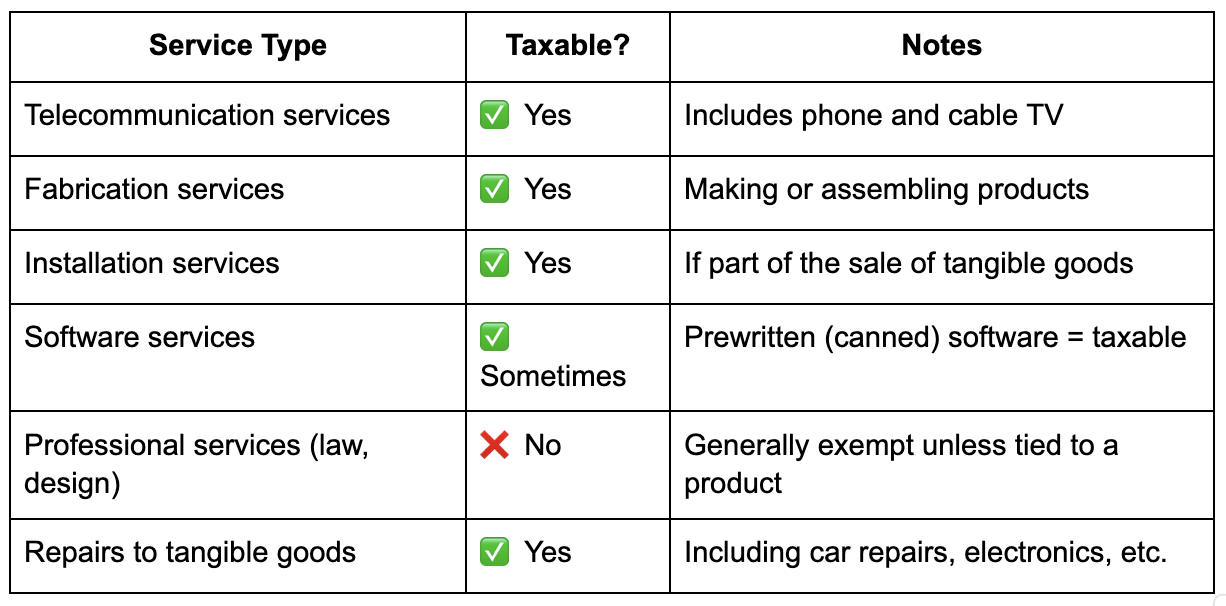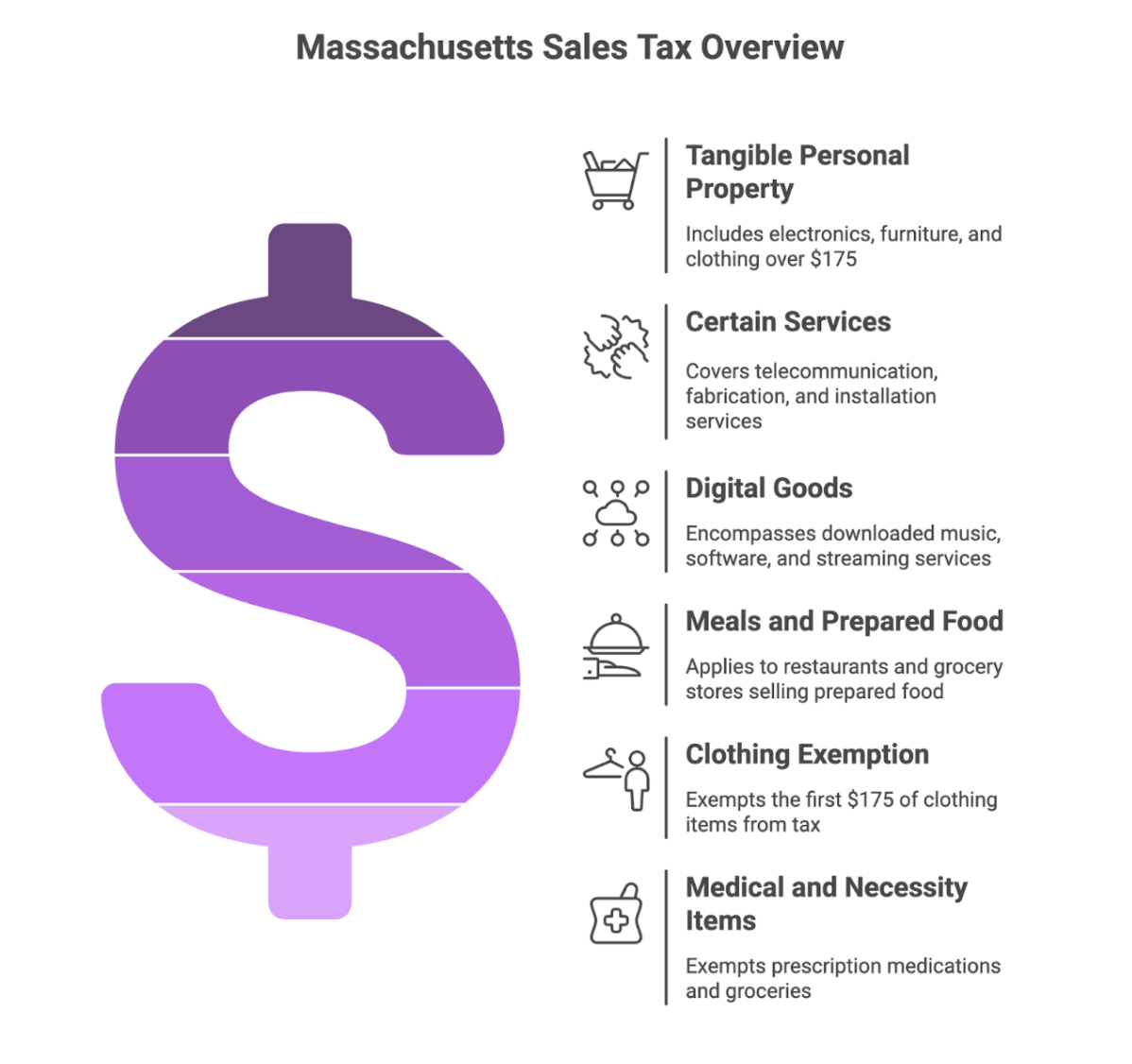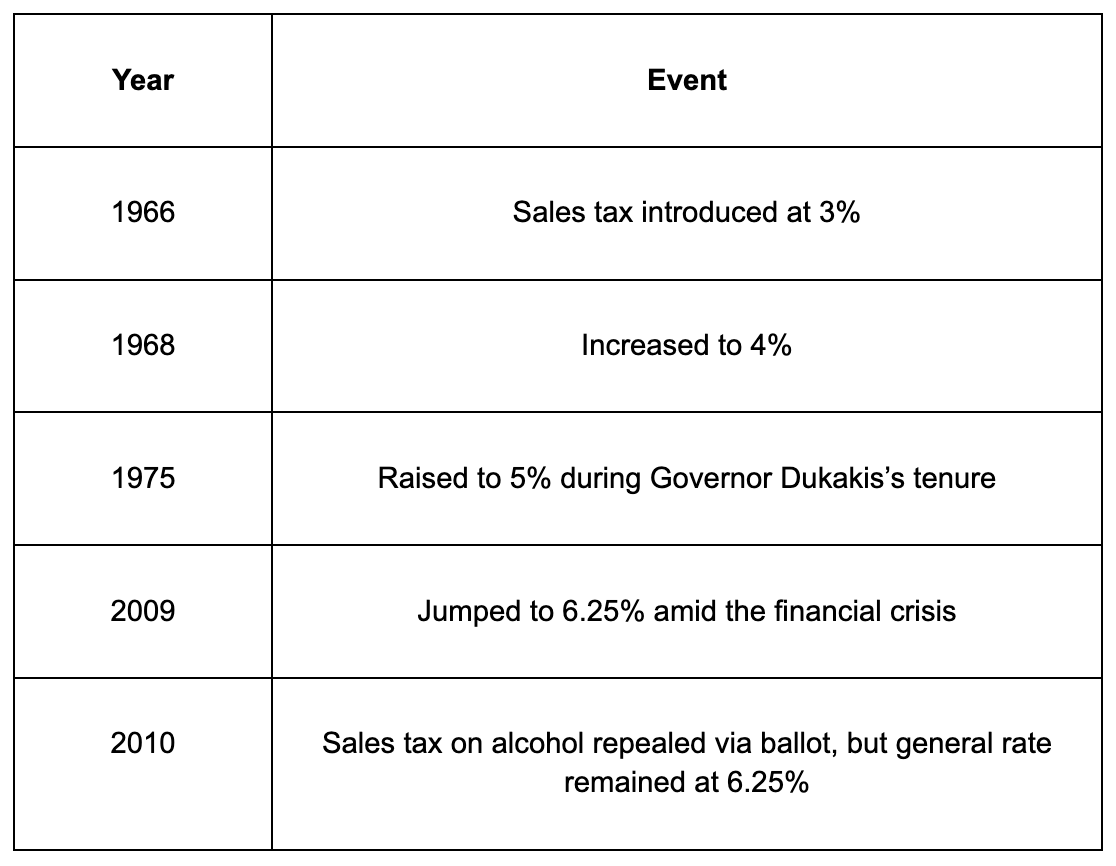If you're selling goods or services in Massachusetts, or even just buying something, the sales tax rate can impact everything from pricing decisions to compliance filings.
But here's where it gets tricky: while the statewide sales tax rate in Massachusetts is 6.25%, that's not the full story. There are exceptions, exemptions, and nuances depending on what you're selling, how you're selling it, and who you're selling it to.
Whether you're a local business, an eCommerce seller with customers in MA, or just trying to file your taxes correctly, understanding how the Massachusetts sales tax rate works is non-negotiable.
In this guide, we'll break it down clearly: What's taxed (and what's not) How the 6.25% rate actually applies in practice What sellers and buyers need to keep in mind
Let's make sense of it, without the jargon.
Sales tax is a consumption tax imposed on the sale of goods and services. In Massachusetts, the sales and use tax is levied on a wide range of items, making it a significant source of revenue for the state. The current state sales tax rate in Massachusetts is 6.25%, which applies to most retail sales.
This rate has remained relatively stable over the years, with only minor adjustments since its introduction. The sales tax is collected by retailers at the point of sale, and they are responsible for remitting these taxes to the Massachusetts Department of Revenue.
This system not only simplifies the process for consumers but also ensures that the state can effectively manage its revenue streams, which are crucial for funding public services such as education, transportation, and infrastructure development.
Massachusetts applies a statewide sales tax of 6.25% on most retail sales of tangible personal property and certain services. But the key is knowing what's actually taxable in Massachusetts because not everything is.
Here's a breakdown of what falls under the sales tax umbrella in the Commonwealth:
This includes any physical items you can touch or move, such as:
Important note: If you sell physical products in MA, even online, you need to collect sales tax in massachusetts at the 6.25% rate unless exempt and remit sales tax to the state.
Unlike some states, Massachusetts doesn't tax all services. But there are exceptions for specific service categories that are subject to tax.

Massachusetts does tax digital products such as:
If you're in the digital space, this is where many businesses get tripped up, especially with remote sales and establishing nexus in massachusetts rules.
Restaurants, food trucks, and grocery stores selling prepared food must collect tax at 6.25% sales tax rate, including:
Unprepared grocery items (e.g. a loaf of bread or bag of rice) are exempt.
Massachusetts provides a clothing exemption – the first $175 of each item of clothing or footwear is not taxed.
Anything above $175 per item? The amount of sales tax applies to the sales price above that threshold.
Example:
Items typically exempt from sales tax include:
Massachusetts keeps it relatively simple with a flat rate, but what's included or exempt can vary based on context. If you're a business owner or seller, you need to know how your product or service fits within the rules and whether you must collect sales tax.

Massachusetts didn't always have a sales tax, it was introduced relatively recently in the state's fiscal history.

The statewide sales tax was first enacted on April 1, 1966, at a 3% rate, pitched as a temporary solution to balance the state's budget. But by 1967, it became permanent following a statewide vote. Since then, the rate has changed multiple times to adapt to Massachusetts' evolving economic and budgetary needs, eventually reaching the current sales tax rate of 6.25%.
The 2009 increase to 6.25% was a turning point. It came during a period of national recession and was meant to stabilize Massachusetts' budget and avoid deep cuts to essential services.
Since then, the sales tax has become a major revenue stream for the massachusetts state, helping to fund:
The Massachusetts sales tax has also sparked ongoing policy debates:
This has led to proposals like targeted exemptions (on food, clothing, and necessities) and discussions around broader tax reform.
While the general sales tax rate is set at 6.25%, there are several exemptions that consumers should be aware of. These exemptions can significantly impact purchasing decisions, especially for larger items or specific categories of goods.
For example, as mentioned earlier, most clothing items priced under $175 are exempt from sales tax. This exemption encourages local sales and supports retailers located in massachusetts. Additionally, certain types of food and beverages, as well as prescription medications, are also exempt, reflecting the state's commitment to public health and welfare.
Non-profit organizations and educational institutions in Massachusetts also benefit from sales tax exemptions. These entities often rely on donations and grants, and the exemption helps them allocate more resources toward their missions rather than tax liabilities.
For example, if a non-profit organization purchases supplies for a community event, they may not have to pay the sales tax on those items, allowing them to maximize their impact in the community.
Furthermore, educational institutions can use these exemptions to acquire necessary materials for their programs, such as books, laboratory equipment, and technology, which can be crucial for enhancing the learning experience for students.
This not only fosters a better educational environment but also promotes a culture of giving and support within the community.
In addition to non-profits and educational institutions, certain energy and agricultural products also enjoy exemptions from sales tax. For instance, purchases of specific types of fuel, such as heating oil and electricity, can be exempt under certain conditions.
This exemption is particularly beneficial for low-income households, as it helps to alleviate some of the financial burdens associated with heating and energy costs during the colder months.
Similarly, farmers and agricultural producers may find relief through exemptions on equipment and supplies necessary for farming operations. This includes items like seeds, fertilizers, and certain machinery, which are essential for maintaining productivity and sustainability in the agricultural sector.
By reducing the tax burden on these critical inputs, the state encourages local food production and supports the agricultural economy, ultimately benefiting consumers through lower prices and a more robust local food system.
For consumers, understanding the sales tax rate is essential for budgeting and financial planning. The additional cost of sales tax can influence purchasing decisions, especially for larger items such as appliances or electronics.
Consumers often find themselves weighing the total sales price, including sales tax, against their budgetary constraints. This consideration can lead to a more cautious approach to spending, prompting shoppers to seek out sales, discounts, or even alternative products that may offer better value without the added tax burden.
Many consumers may not consider the sales tax when shopping online, where the total cost can vary significantly based on the tax rate applied. In Massachusetts, online retailers are required to collect massachusetts sales tax on purchases made by residents, ensuring that local businesses remain competitive.
This requirement can sometimes lead to confusion for consumers who may be accustomed to tax-free online shopping from out-of-state retailers. As a result, they may need to adjust their expectations and shopping habits, particularly when comparing prices across different platforms.
Small businesses in Massachusetts must navigate the complexities of sales tax collection and remittance. Sales tax compliance is critical to avoid penalties and maintain good standing with the state. The process can be particularly daunting for new entrepreneurs who may lack experience in tax matters.
As they establish their businesses, they must familiarize themselves with the nuances of tax rates, exemptions, and filing deadlines, which can vary not only from state to state but also within different municipalities. Many businesses need to register for a sales tax permit in massachusetts before they can legally collect tax.
For small retailers, the sales tax can be a double-edged sword. While it is a necessary part of doing business, it can also be a burden, especially for those who may not have the resources to manage tax compliance effectively. Many small business owners invest in a massachusetts sales tax calculator or hire professionals to ensure they are meeting their obligations when they file a sales tax return.
Additionally, some businesses may choose to absorb the sales tax costs to remain competitive, which can further strain their profit margins. This balancing act often requires careful financial planning and strategic pricing to ensure sustainability in a competitive market. The implications of sales tax extend beyond mere compliance; they can shape the overall business strategy and customer relationship management as small businesses strive to maintain their foothold in the local economy.
Understanding when you have nexus in massachusetts is crucial for out-of-state sellers, as this determines whether you must collect massachusetts sales tax from customers. The correct sales tax rate must be applied to all taxable sales, and businesses need to collect sales tax from customers at the point of sale or rental charge.
Businesses that collect sales tax in massachusetts must regularly file sales tax returns with the Massachusetts Department of Revenue. The frequency of filing sales tax returns depends on your volume of taxable sales and the amount of tax due each period.
When you register for sales tax in massachusetts, you'll receive information about filing deadlines and requirements. It's important to file a sales tax return even if you had no sales during the period, as failing to file can result in penalties.
The massachusetts sales tax guide provides detailed information about compliance requirements, including how to calculate the tax required to be shown on returns and what constitutes willful tax evasion. The tax shown on the return must accurately reflect all sales or use tax collected during the reporting period.
For businesses that fail to comply, the Massachusetts Department of Revenue may impose penalties for unpaid tax, neglecting or disregarding tax laws, or understating tax liability on a return. Interest may also accrue at the federal short-term rate plus additional percentage points.
Unlike some states, massachusetts has a statewide sales tax system without local sales taxes. This means there are no additional city sales tax rates or local sales tax rates to worry about when determining the amount you need to collect.
However, businesses should be aware that some items sold or rented in massachusetts may be subject to special rules. For items for use in massachusetts, the sales or use tax applies based on the sales price or rental charge at the time of purchase.
If you're unsure about specific requirements or need clarification on complex situations, you can contact the massachusetts department of revenue directly. They provide guidance on everything from basic compliance to complex global tax compliance scenarios.
For businesses using automated systems, a sales tax calculator can help ensure you're applying the correct rate to all transactions. However, it's important to understand that massachusetts sales tax returns must be filed accurately, and any discrepancies between the sales tax you collect and what you report can result in penalties.
Whether you're a small business owner, an online seller, or just managing everyday purchases, understanding how Massachusetts sales and use tax works is more than a compliance task, it's a business essential.
From knowing which goods are taxable to filing returns on time, staying sharp on the 6.25% rate and its rules can help you avoid penalties, budget accurately, and maintain trust with your customers or clients.
And while the system may seem straightforward on paper, the real world often throws in curveballs: exemptions, product-specific rules, out-of-state sales, and evolving tax laws.
If you're running a business and want to stay focused on growth, not tax filings, it helps to have experienced professionals by your side.
Madras Accountancy supports startups and small businesses across the U.S. with accurate, reliable sales tax tracking, bookkeeping, and Virtual CFO services. So you're never scrambling when tax season hits.
Ready to get your numbers right from day one?
Reach out to Madras Accountancy to stay ahead of the curve.

A practical comparison of hiring a freelancer vs using a dedicated offshore accounting team, focusing on continuity, quality control, security, and scaling.

How CPA firms outsource payroll and 1099 work to reduce penalties and admin load, with a clean workflow for approvals, filings, and year-end reporting.

Practical do's and don'ts for CPA firms outsourcing accounting work, based on common failure points and what successful rollouts do differently.